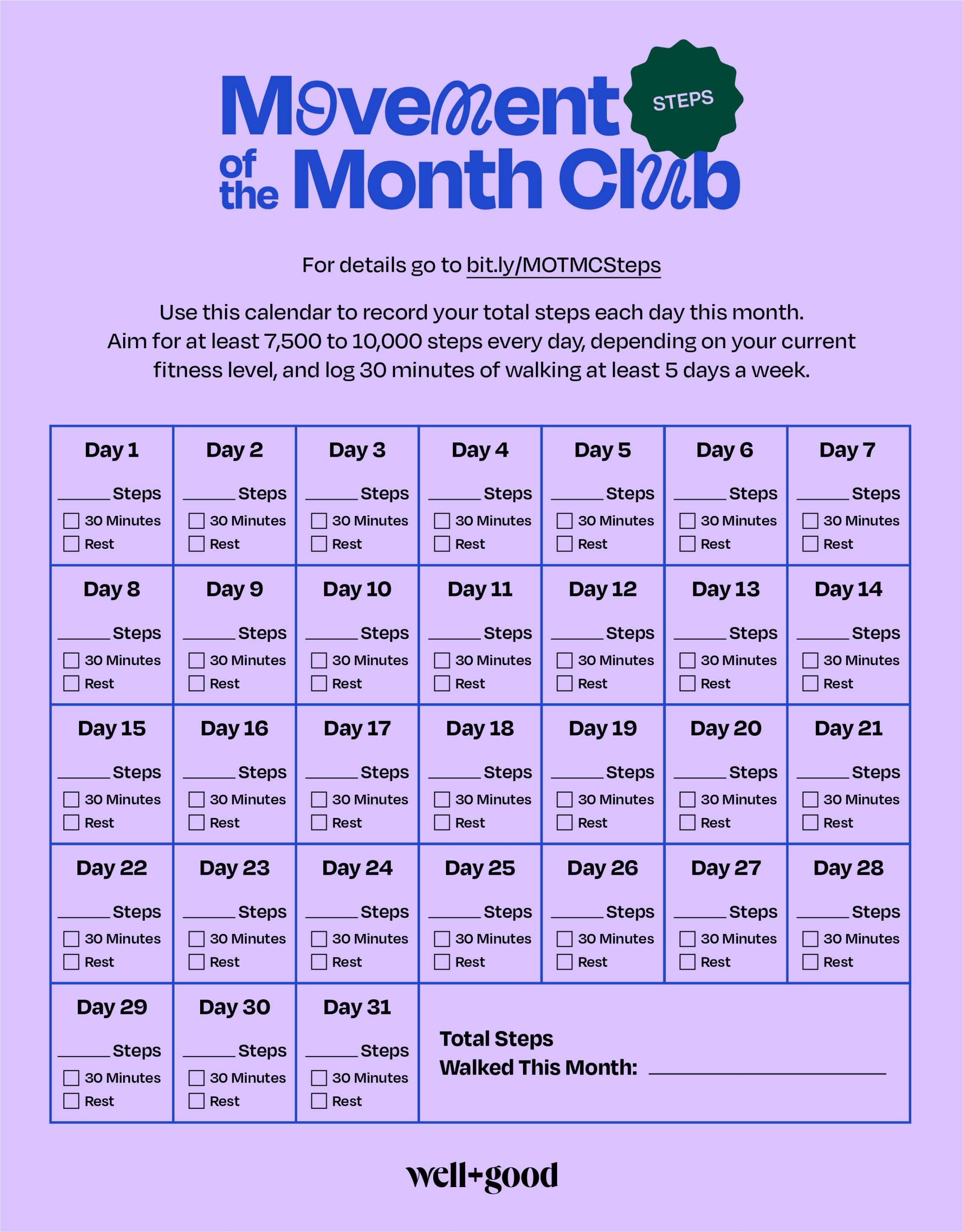Walking isn’t just great for your physical health—it’s a fantastic way to clear your mind or turn a catch-up with friends into an active outing.
To help you stay motivated and increase your daily steps, our May 2024 Movement of the Month Club is dedicated to walking. So lace up your walking shoes; it’s time to take advantage of the fresh air and sunshine that only come with spring.
In This Article
Your goals for this step challenge
- Focus on increasing your daily step count, aiming for at least 7,500 to 10,000 steps a day.
- Walk for at least 30 minutes at least 5 times a week—even 10 minutes at a time.
Why 7,500 to 10,000 steps?
Ever heard that you need 10,000 steps daily? Kind of like how you have to drink eight 8-ounce glasses of water a day, it turns out these “rules” might be a little too cookie-cutter.
A May 2019 study in JAMA Internal Medicine found that the perks of walking—like boosting your mood, improving your heart health, and keeping your joints strong—start to plateau around 7,500 steps.
And it’s not just one study. A March 2022 review in Lancet Public Health looked at more than 47,000 walkers and found that for those over 60, the sweet spot lies between 6,000 and 8,000 steps, while the younger crowd might aim for 8,000 to 10,000 steps.
If 10K feels out of reach—or even 7.5K—don’t sweat it. What’s crucial is moving regularly, making strides in whatever way fits your life. Maybe you’re already tracking your steps? Great, see what your average day looks like. If you’re not a counter yet, use the first day of the month to get a better sense of your daily step count.
Turns out, most of us reach about 3,000 and 4,000 steps on an average day, per the Mayo Clinic. Note your starting line so you can see how far you’ve come by the end of the month. And yes, some days won’t see much more than that—and that’s OK. Life happens! Set goals that make sense for you, not just numbers on a screen.
Don’t forget, the length of your daily walks matter, too. According to the Physical Activity Guidelines for Americans, people should aim for at least 150 to 300 minutes of heart-pumping aerobic activity each week. That’s why we want you to walk for 30 minutes at least five times a week—even if it’s walking 10 minutes at a time. Depending on your pace, this could easily add 2,000 to 3,000 steps to your daily tally, per Gundersen Health System.
Calendar for the Movement of the Month Club step challenge

Get a printer-friendly version of the calendar here.
How to join the Movement of the Month Club
1. Find a way to track your steps
You can wear a fitness tracker or smart watch, clip a pedometer to your clothes, or carry your phone with you to count your steps. If your phone doesn’t come with a health app to monitor your movement, download a walking app. And make sure you have a supportive, comfortable pair of walking shoes.
2. Print and/or save your calendar
Print out the calendar above or save it to your phone and fill in your steps each day to help you stay on track and monitor your progress.
3. Join the club on Facebook
Our community of nearly 60,000 members (and growing!) is here to support and motivate you through this month. Tell the group how the day’s walking went, post photos or videos of your walks, or share your favorite walking meme or motivational quote.
4. Get walking
No matter your baseline number, focus on walking a little more each day. Swap your water bottle for a small glass so you have to get up more often to refill it, or park farther away when you’re running errands. These and other creative ways to take more steps can help you reach your daily goals.
5. Celebrate your success!
You made it to the end! Take some time to appreciate that accomplishment—and let us know how it went in our Facebook group.
Well+Good articles reference scientific, reliable, recent, robust studies to back up the information we share. You can trust us along your wellness journey.
- Lee I, Shiroma EJ, Kamada M, Bassett DR, Matthews CE, Buring JE. Association of Step Volume and Intensity With All-Cause Mortality in Older Women. JAMA Intern Med. 2019;179(8):1105–1112. doi:10.1001/jamainternmed.2019.0899
- Paluch AE, Bajpai S, Bassett DR, Carnethon MR, Ekelund U, Evenson KR, Galuska DA, Jefferis BJ, Kraus WE, Lee IM, Matthews CE, Omura JD, Patel AV, Pieper CF, Rees-Punia E, Dallmeier D, Klenk J, Whincup PH, Dooley EE, Pettee Gabriel K, Palta P, Pompeii LA, Chernofsky A, Larson MG, Vasan RS, Spartano N, Ballin M, Nordström P, Nordström A, Anderssen SA, Hansen BH, Cochrane JA, Dwyer T, Wang J, Ferrucci L, Liu F, Schrack J, Urbanek J, Saint-Maurice PF, Yamamoto N, Yoshitake Y, Newton RL Jr, Yang S, Shiroma EJ, Fulton JE; Steps for Health Collaborative. Daily steps and all-cause mortality: a meta-analysis of 15 international cohorts. Lancet Public Health. 2022 Mar;7(3):e219-e228. doi: 10.1016/S2468-2667(21)00302-9. PMID: 35247352; PMCID: PMC9289978.
- Mayo Clinic: “10,000 steps a day: Too low? Too high?”
- Physical Activity Guidelines for Americans
- Gundersen Health System: “Pedometer Conversion Chart”
Source: Well and Good









